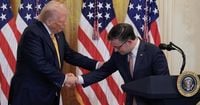Three weeks into one of the most contentious government shutdowns in recent memory, the battle over federal spending in Washington has escalated into a full-blown constitutional crisis. On October 16, 2025, the Senate failed for the tenth time to end the impasse, adjourning without a deal and leaving the government shuttered until at least October 20. Meanwhile, President Donald Trump has taken the unprecedented step of sidestepping Congress to pay military salaries, a move that critics say threatens to upend the very foundation of American governance.
According to TNND, the shutdown has paralyzed Congress: the House has not been in session for a month, while senators left Washington frustrated and empty-handed. Republican leaders have drawn a line in the sand, refusing to negotiate with Democrats until a short-term funding bill is passed to reopen the government. Democrats, on the other hand, insist on guarantees to extend health insurance subsidies before agreeing to any deal. The standoff has left millions of Americans in limbo and prompted heated rhetoric from all sides.
President Trump, speaking to Fox News’ Maria Bartiromo, blamed Democrats for the prolonged shutdown and revealed that his administration was permanently cutting programs Republicans never supported. "I think they could just stay out forever, I mean, to be honest with you. Now, what we're doing is we're cutting Democrat programs that we didn't want because... I mean, they made one mistake. They didn't realize that that gives me the right to cut programs that Republicans never wanted. You know, giveaways, welfare programs, et cetera. And we're doing that, and we're cutting them permanently," Trump said, according to TNND.
Senate Majority Leader John Thune echoed the administration’s stance, stating that Trump is “ready to weigh in and sit down with the Democrats or whomever, once the government opens up.” However, Democratic leaders Chuck Schumer and Hakeem Jeffries have accused Republicans of not negotiating in good faith. “Leader Thune has not come to me with any proposal at this point,” Schumer said on Thursday, highlighting the deep partisan divide.
Amid the legislative gridlock, the Pentagon identified funds to temporarily pay active-duty troops. But with the next military payday looming on October 31, uncertainty remains. Department of Homeland Security Secretary Kristi Noem tried to reassure law enforcement officers, announcing that over 70,000 sworn DHS officers would receive a 'super check' by October 22, covering lost days, overtime, and the next pay period. “President Trump and I will always stand by law enforcement, and we are keeping our promise to always support them by making sure they are paid during the Democrats’ shutdown,” Noem wrote on social media.
Yet, the consequences of the shutdown are spreading. The U.S. Department of Agriculture warned in an October 10 letter that if the funding lapse continues, approximately 42 million Americans relying on the Supplemental Nutrition Assistance Program (SNAP) will not receive full benefits in November. This sharpens the stakes for families across the country and raises the specter of real hardship if the deadlock drags on.
But the most controversial development has been the president’s direct intervention in federal spending. As detailed in The New York Times and Roll Call, Trump issued a national security presidential memorandum directing the Secretary of War and the Office of Management and Budget to use any available funds appropriated by Congress for Fiscal Year 2026 to pay active duty and reserve military personnel. This includes redirecting funds originally intended for military research and development over the next five years—a maneuver that has left legal scholars and lawmakers aghast.
“President Trump has been ignoring Congress’ authority to say which funds should be spent since the early days of this administration. He is now increasingly disregarding the requirement of an appropriation before spending money,” said David Super, a Georgetown Law professor and federal budget law expert, to Roll Call. “This renders the appropriations process essentially meaningless if the president continues along this course.”
The administration’s official justification is that the Pentagon is using funds that have a “reasonable, logical relationship” to military pay and benefits, citing compliance with the so-called purpose statute—federal law requiring appropriations “shall be applied only to the objects for which the appropriations were made except as otherwise provided by law.” A senior administration official told Roll Call that Congress always intended to keep the military funded, and that research and development accounts, with their two-year availability, were the logical place to find money when personnel accounts ran dry.
But critics from both parties have called foul. G. William Hoagland, a longtime Senate GOP budget aide, said Trump’s budget moves are “without precedent” and that even President Nixon’s notorious spending tactics “pale in comparison.” Senator Jerry Moran, a Kansas Republican and senior Appropriations Committee member, remarked, “It’s always preferable that Congress not only be consulted, but when it comes to appropriations, the Constitution requires the appropriations to be done by Congress.”
Democrats have been equally critical, though wary of appearing to oppose troops’ pay. Senator Christopher S. Murphy of Connecticut told Roll Call, “I don’t know that he’s got legal authority … to do any of this. We all want to pay the troops, but … these complicated schemes to pay the troops that he’s using is just evidence of how badly they want to avoid negotiations.” Bobby Kogan, a former Democratic budget aide, was more blunt: “At this point Trump is an appropriations king; he gets to do whatever he wants.”
Trump’s actions have ignited a fierce debate over the separation of powers. Legal experts argue that Article 1 of the U.S. Constitution grants Congress—and only Congress—the authority to decide how public money is spent, especially on the military. The president’s memorandum, which cites 31 U.S.C. 1301(a), is seen by many as a misreading of the law, which specifies that “appropriations shall be applied only to the objects for which the appropriations were made except as otherwise provided by law.”
House Speaker Mike Johnson has thrown his support behind Trump, declaring the president has “every right” to redistribute congressionally appropriated funds and daring Democrats to challenge the move in court. “If the Democrats want to go into court and challenge troops being paid, bring it,” Johnson said, according to The New York Times. For now, there are no signs of an imminent lawsuit, and it’s unclear who would have standing to mount such a challenge.
Trump even floated the idea of letting a wealthy private citizen pay the troops directly if there’s a shortfall, though the president has not acted on the offer. “I actually have a man who is a very wealthy person, he said, ‘If there is any money necessary, shortfall for the paying of the troops, I will pay it,’ meaning he will pay it,” Trump reportedly said at an event.
This latest power grab follows a year of executive branch maneuvers that have repeatedly bypassed or undermined congressional appropriations. From imposing tariffs without clear legal authority to dismantling federal agencies, the administration has tested—and, in the eyes of many, exceeded—the limits of presidential power. Georgetown Law’s Super noted that Trump’s budget office, led by OMB Director Russ Vought, has argued that the 1974 budget law doesn’t require presidents to spend every penny appropriated, but now seems to believe the administration can spend money it doesn’t have or for purposes Congress did not intend.
With the shutdown poised to become the third-longest in U.S. history, and with Senate Democrats lacking the votes for impeachment or leverage in negotiations, the crisis shows no sign of abating. The Supreme Court is set to hear arguments on the legality of Trump’s tariff actions in November, but on the spending front, the president’s aggressive interpretation of executive authority may set a lasting precedent—one that, as many warn, could fundamentally alter the balance of power in Washington.
As the shutdown grinds on and the nation’s institutions strain under the weight of partisan conflict, the standoff over the power of the purse is shaping up to be a defining test for American democracy in the 21st century.





